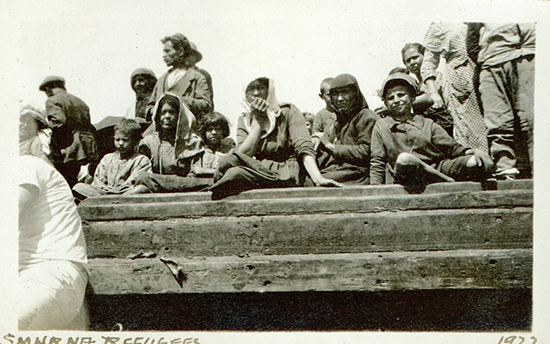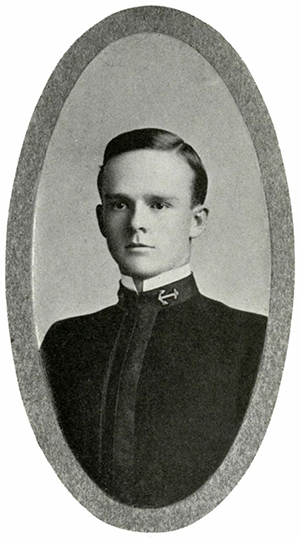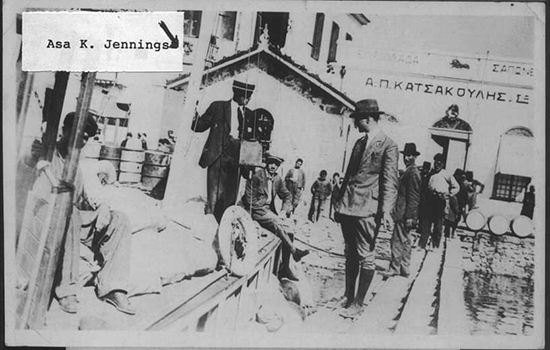A Failed Minister Who Saved 250,000 Christians
COM prof’s book highlights little-known hero of Armenian genocide
Asa Jennings was a failed small-town Methodist minister from upstate New York working for the YMCA in Smyrna, Turkey, in 1922, when he saved a quarter of a million Christians from perishing in a brutal final chapter of the Armenian Genocide.
“A private individual, a guy without portfolio, who held a minor position in the YMCA, came forward and put together this astonishing rescue,” says Lou Ureneck, who spent four years researching and writing Jennings’ story. “One of the things I hope the book does is give America another hero. People ought to know about the work of Asa Jennings.”
The College of Communication journalism professor will read from his book, The Great Fire: One American’s Mission to Rescue Victims of the 20th Century’s First Genocide (Ecco, 2015) tonight, Tuesday, May 19, at the Harvard Book Store in Cambridge at 7 p.m. The book was published last month to coincide with the 100th anniversary of the genocide’s beginning. The story’s staying power can be seen in the continuing controversy over use of the word “genocide” and persecution of Christian minorities in other Muslim countries in the Middle East.

Beginning in 1915, the Ottoman government began the systematic elimination of its Armenian minority, along with Greeks and other Christian minorities, in Turkey, killing perhaps three million people and driving many more out of the country. The book makes clear that the slaughter was a 10-year-long genocide of Christians, beginning in 1912, and not the commonly described two-year Armenian genocide of 1915 to 1917.
Smyrna, known today as Izmir, had been a cosmopolitan port under Greek rule, where Greeks, Turks, Armenians, Jews, and Europeans did business in relative peace. But after Turkish armed forces defeated the Greeks in September 1922, they began a religious cleansing, with executions and arrests sparking mob violence, rape, and pillage.
In a frantic effort to escape, hundreds of thousands of terrified Christians fled to the quay along the harbor in hopes of finding safe passage. The Turks responded by lighting the city on fire. “A half a million people, packed into a narrow strip of pavement, maybe a mile and a half, two miles long, as a giant fire comes at them, basically pushing them into the sea,” Ureneck says. “And many of them did jump into the sea, either trying to swim to ships, or committing suicide, or their clothes and packages had caught on fire.”
Jennings, a short, mild-mannered fellow with back problems, had managed to get his family on a ship out with other Americans, but he stayed behind in an effort to help several thousand refugees in safe houses along the quay. Horrified by what he saw, he first bribed an Italian ship captain to spirit away the people from the safe houses. Then he hatched an even bigger plan, securing a flotilla of empty Greek merchant ships to save thousands more.

American sailors watching the slaughter on the quay were moved to intervene where they could, plucking drowning refugees from the water and stopping individual acts of violence. But beyond protecting its own citizens, the US government, with growing commercial ties to Turkey, was unwilling to get involved, especially so soon after a costly war. America’s top officer in the region, Admiral Mark Bristol, played tennis outside Constantinople (present-day Istanbul) as Smyrna burned.
But the Navy’s man on the scene in Smyrna, Lt. Commander Halsey Powell, moved to help Jennings execute the evacuation even though it contravened his orders. Much of it was done quietly, behind the scenes, but at one crucial moment, Powell aimed his ship’s big guns at the Turkish Army. The gesture alone was enough to “transform the situation,” Ureneck says.
The author of Backcast: Fatherhood, Fly-fishing, and a River Journey through the Heart of Alaska and Cabin: Two Brothers, a Dream, and Five Acres in Maine, Ureneck had a long, much-honored career as a newspaper editor (Portland Press Herald, Maine Sunday Telegram, and Philadelphia Inquirer) before joining the University. He first read a brief mention of Jennings in a book about Smyrna perhaps 30 years ago.
“I wondered, who is this man,” he says. “He saved a lot of lives, and it struck me as one of the great untold stories of American history.”
He held onto the idea, and four years ago began research in earnest, visiting libraries and archives in Washington, London, and numerous other cities. Some of his best sources were US Naval reports from officers on the scene. He toured some of Jennings’ churches in New York, where the pastor was little, if at all, remembered, and met with Jennings’ grandson and studied his diaries. He also visited many of the locations in the book on four trips to Turkey.
“I had been reading about this horrible event for a long time, and finally I found myself there,” Ureneck says. “Now, the modern city of Izmir is a concrete and glass metropolis. The old Smyrna was destroyed and a modern city grew up in its place. But still, it’s easy to imagine. The Point is still there, the place where the Turkish machine guns kept refugees from escaping is still there, the pier is still there…there are these artifacts that will remind one of the old story. There was so much suffering.”
Jennings was in fact recognized for a brief period after the burning of Smyrna, but his story and that of the genocide fell victim to a State Department campaign to protect the diplomatic and commercial relationship with a reascendant Turkey.
Ureneck found that many in Turkey cling to a different version of events, often blaming Armenians for starting the fire.

“What I found is, those years are a black hole in Turkish history for the Turkish people,” he says. “The history as it’s taught in Turkey is shaped by the ideology.”
In general, “the people of Izmir know there was a fire, and they know that Greeks and Armenians used to live there, and they know that there was a population exchange. But they don’t know much else about what happened,” Ureneck says. “People had lots of questions for me about what did I know and where did I learn it?…I think more and more there is an educated class in Turkey that wants to know.”
He says that Armenian attempts to bring the story to the fore—as well as the Pope’s recent statement calling it a genocide—have shifted people’s understanding.
“I think the world has awakened to what happened in Asia Minor during those years,” Ureneck says. “When will Turkey stop denying it? I have no idea. But clearly there are a lot of people in Turkey who would like to know the truth, who are willing to admit the truth, who want to know the facts. So I think eventually Turkey will reconcile itself to its history. But it’s not an easy thing for any country to do, to admit it participated in a genocide.”
Lou Ureneck will read from The Great Fire at the Harvard Book Store, 1256 Massachusetts Ave., Harvard Square, Cambridge, today, Tuesday, May 19, at 7 p.m. Via public transportation, take a MBTA Red Line train to Harvard Square.

Comments & Discussion
Boston University moderates comments to facilitate an informed, substantive, civil conversation. Abusive, profane, self-promotional, misleading, incoherent or off-topic comments will be rejected. Moderators are staffed during regular business hours (EST) and can only accept comments written in English. Statistics or facts must include a citation or a link to the citation.